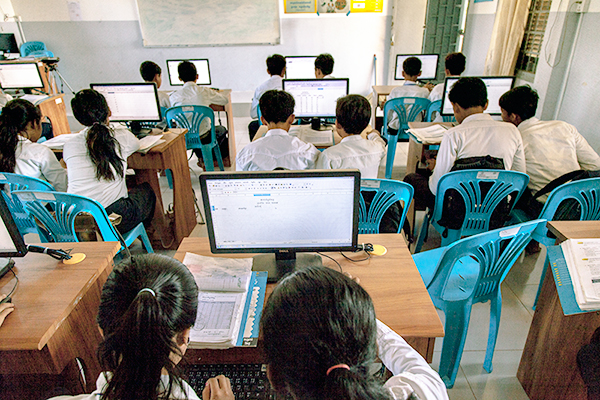
Phnom Penh, CambodiaCambodia finally passed in March a number of long-awaited electoral reform laws. Parliament had been discussing drafts for the better part of a year. These reforms are meant to address grievances from the last elections, which were marred by accusations against the ruling party of irregularities, electoral fraud and intimidation.
The passage of these laws was a highly politicized process and involved frequent discussions by Cambodia’s top powerbrokers.
One of the most important new laws is a change in the composition of the National Election Committee to a more politically balanced body with four members each from the two main political parties and a neutral ninth member from civil society. This law reflects a very important political compromise and provides for greater equity between the two main parties.
An uncertain but optimistic future
As these laws were being finalized, I followed the developments from Cambodia’s capital, where I had traveled as part of a small team from Creative Associates International to identify innovative ways to assist with Cambodia’s electoral and democratic reforms process.
Many of the leading civil society and human rights leaders with whom I met raised some legitimate concerns regarding these laws.
Among the articles in the new laws that concern some groups is a provision proscribing heavy fines and bans for nongovernmental organizations that insult parties or candidates during the 21-day campaign period.
Another worrying provision of the reforms is the possibility of political parties having some of their parliamentary seats taken away if they choose to boycott Parliament.
There is no doubt that hard-fought progress has been made in this round of reforms. Although many would have hoped for more, citizens of this nascent democracy are learning to live with the imperfections of political compromise that comes with an evolving democratic system. The communal elections of 2017 and the next general elections in 2018 will reveal how Cambodia’s electoral processes are truly progressing.
However, I remain optimistic that Cambodia will have success in electoral reform because I have seen firsthand the hard work and positive effects that many of these civil society groups bring to their communities and country. I have no doubt that they will work to ensure that the reforms are implemented fairly and effectively to move towards more peaceful, inclusive and credible elections.
Solar-powered computers to educate voters
A key step for civil society toward ensuring that reformed laws advance rather than diminish democracy in the country will be to educate and mobilize the electorate so that they can act as a watchdog over the government’s implementation of the laws and make their voice heard at the polls.
In Cambodia, Creative is concluding an innovative project, called the School Dropout Prevention Pilot, through which youth and their families in hundreds of schools throughout Cambodia learn new skills in solar powered computer labs. The project is funded by the U.S. Agency for International Development.
Given the success of these computer labs and their popularity among youth, our path to promote civic engagement in electoral reforms is clear—use this innovative, environmentally-friendly and affordable technology as a tool to provide voter education to citizens.
Schools already serve as election hubs in Cambodia. Teachers, especially women, play an important role in voter education, and the 12 to 15-year-olds using the labs are future voters. Therefore it seemed a natural solution that Creative could strengthen electoral processes in Cambodia by increasing the role of youth and women in them, relying on sustainable and innovative technologies that have already proven successful.
Technology’s role in electoral progress
As Cambodians take these electoral reforms forward, I believe that the technology Creative has piloted and proposed to incorporate into its elections work will increase the enthusiasm and engagement of the new generation of Cambodians in future elections.
The 2013 elections demonstrated the power of social media and urban youth to influence the country’s politics. Young people across the country turned out in unprecedented numbers in these last elections and made their voices heard. Creative’s computer labs in rural areas could empower youth to create positive change in elections behavior at a more grassroots level.
Cambodian politics has long been mired by the problems of a seemingly intractable status quo, which has been characterized by one-party dominance. One of the keys to improving democracy in Cambodia centers on improving citizens’ knowledge of, and participation in, the electoral and democratic processes of the country.
Civic and voter education programs can help teach people about their rights as citizens and strategies for holding their elected officials accountable. This increased knowledge can, in turn, help to strengthen Cambodia’s democratic development and empower civil society to build a more democratic future.
Christopher Smyser is a Program Specialist in the Electoral Education and Integrity Practice Area at Creative Associates International.